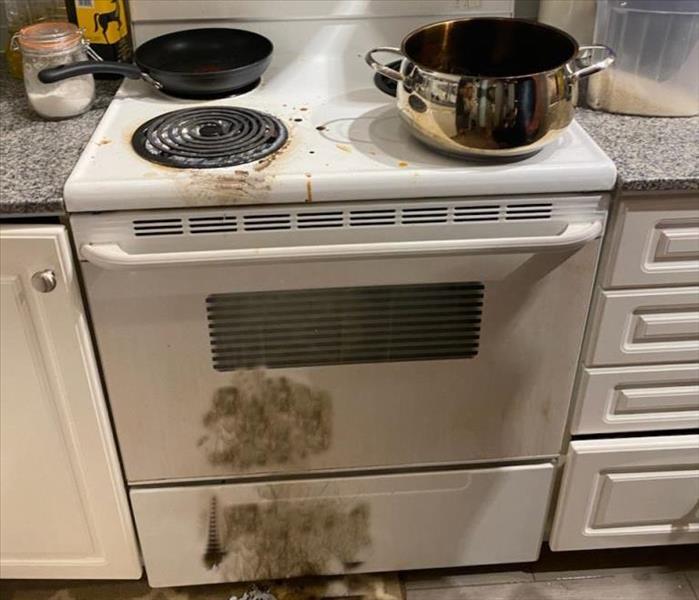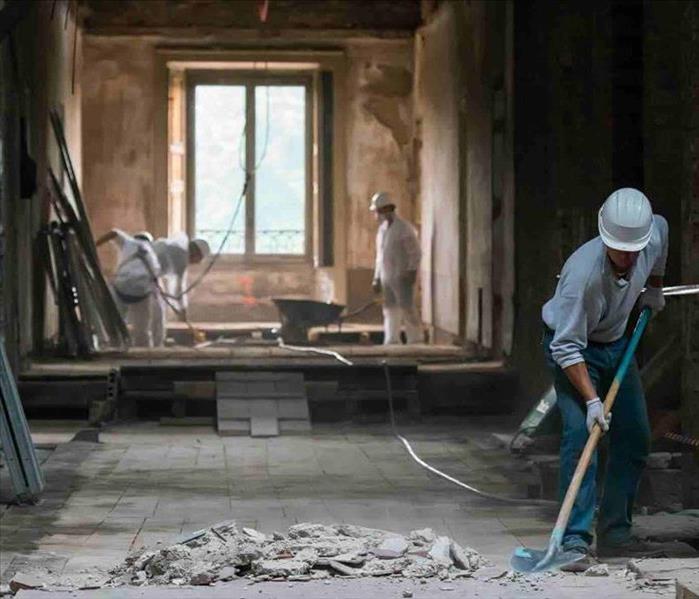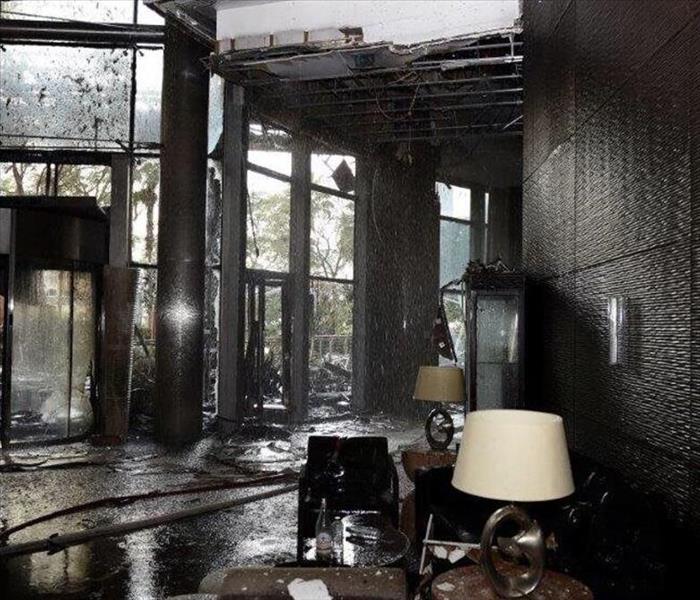Recent Fire Damage Posts
Steps to Restore Fire Damaged Properly
11/10/2020 (Permalink)
 Burnt pot caused fire, smoke and soot in whole house
Burnt pot caused fire, smoke and soot in whole house
Damage suffered due to fire is something no homeowner would want to experience. Nobody goes into ownership or start a business, assuming that they will have to rebuild after a fire. We take every precautionary measure to ensure that our property remains safe from fires and other disasters. However, many unexpected causes like a faulty appliance or damaged wiring lead to fires. In some cases, human error is also a leading cause. Whichever the reason, the fire caused needs immediate control, or else it does considerable damage to the property. The priority here is to clear the building of people and call in a fire emergency to control the spread.
Once the fire settles restoration emergency services start the challenging phase of property restoration to avoid further damage. Restoration service begins with the knowledge of the extent of damage, commencing renovations and securing undamaged items. Every company follows a standard procedure of fire damage restoration that you need to understand. Once you know the steps of the process, you prepare yourself for an incident in the future.
Steps of Fire Damage Restoration
Restoration emergency services follow a standard procedure to restore the property in its original state after fire and water (due to firefighters) damage:
- Assessment of the Situation
The first step of restoration services is to assess the property for the extent of the fire and smoke damage. The assessment helps to understand the deepness of fire penetration, the smoke level and if the walls show signs of damage. Experts conduct an evaluation before initiating the restoration process to record and document everything. Assessment is also necessary to show the extent of the damage for insurance purposes. Restoration emergency services immediately remove any untouched furniture after evaluation. Lingering smoke embeds itself in the fiber and surfaces, so the sooner the removal, the better.
- Isolation of Unsafe Areas
The second step of the restoration process is to isolate the areas that seem unsafe after extinguishing the fire. Restoration emergency services assess different areas of the building and determine the damage caused by fire and water doused for controlling. Experts isolate and block unsafe areas top to prevent potential injury or further damage.
The next step is to dry the area and clear the water present inside. Firefighters use water to douse the fire that can cause severe damage if left unchecked. Stagnant water can cause damage to plumb lines, walls, wooden cabinets and in worst cases, the foundations. Humidity and moisture also give rise to mold and fungus to grow and expand, further damaging the property. Restoration emergency services use specialized equipment to pump out all the water residue and humidity to prevent further damage to the property.
After the removal of water and drying the property, experts focus their attention on the reduction of soot and smoke. The smoke left after the fire is as much damaging as the fire itself. Most of the times, fire leaves a thin layer of soot on walls, ceilings and other surfaces that experts carefully remove using related equipment. They sometimes use a technique called air scrubbing to remove the soot and remove smoke odor.
For the next step, restoration emergency services sanitize and clean the property. This is an essential step as the debris and smoke left behind by fire renders a place inhabitable. Cleaning the area and sanitization helps determine salvageable or discarded items. Experts start to work in possessions not affected by the fire and restore then to their original quality. Experts take sanitization and pre-cleaning seriously because of the corrosive effects of soot and smoke. Experts do a deep cleaning to reach every single area and neutralize odor caused by soot and smoke.
After removal of smoke and initial cleanup, experts determine repairs and renovations needed on the property. Fire and water cause damage to plumb lines, wirings, furniture and other heirlooms that need repairs and renovations to restore. Restoration emergency services work on items left after discarding the possessions damaged beyond repair. Many fire damage companies offer renovation services in combinations with their restoration activities to make the place habitable again.
- Final Assessment and Cleanup
Restoration emergency services conduct a final assessment to identify any shortcoming and perform cleanup before finishing.
Final Word
Fire damage restoration is more than just a quick clean up and repairs of areas the fire has touched. Restoration emergency services have to take into account all the necessary steps to ensure they leave the place habitable again. They have to assess the property carefully and take the required measures accordingly. As a homeowner, do not try to make a decision by yourself and start the cleanup. Contact professional services with expertise and resources to restore the property to its original state and make it habitable again.
Steps to Restore Fire Damaged Property
11/6/2020 (Permalink)
 Img Credit: www.nationalcashoffer.com
Img Credit: www.nationalcashoffer.com
Damage suffered due to fire is something no homeowner would want to experience. Nobody goes into ownership or start a business, assuming that they will have to rebuild after a fire. We take every precautionary measure to ensure that our property remains safe from fires and other disasters. However, many unexpected causes like a faulty appliance or damaged wiring lead to fires. In some cases, human error is also a leading cause. Whichever the reason, the fire caused needs immediate control, or else it does considerable damage to the property. The priority here is to clear the building of people and call in a fire emergency to control the spread.
Once the fire settles restoration emergency services start the challenging phase of property restoration to avoid further damage. Restoration service begins with the knowledge of the extent of damage, commencing renovations and securing undamaged items. Every company follows a standard procedure of fire damage restoration that you need to understand. Once you know the steps of the process, you prepare yourself for an incident in the future.
Steps of Fire Damage Restoration
Restoration emergency services follow a standard procedure to restore the property in its original state after fire and water (due to firefighters) damage:
- Assessment of the Situation
The first step of restoration services is to assess the property for the extent of the fire and smoke damage. The assessment helps to understand the deepness of fire penetration, the smoke level and if the walls show signs of damage. Experts conduct an evaluation before initiating the restoration process to record and document everything. Assessment is also necessary to show the extent of the damage for insurance purposes. Restoration emergency services immediately remove any untouched furniture after evaluation. Lingering smoke embeds itself in the fiber and surfaces, so the sooner the removal, the better.
- Isolation of Unsafe Areas
The second step of the restoration process is to isolate the areas that seem unsafe after extinguishing the fire. Restoration emergency services assess different areas of the building and determine the damage caused by fire and water doused for controlling. Experts isolate and block unsafe areas top to prevent potential injury or further damage.
The next step is to dry the area and clear the water present inside. Firefighters use water to douse the fire that can cause severe damage if left unchecked. Stagnant water can cause damage to plumb lines, walls, wooden cabinets and in worst cases, the foundations. Humidity and moisture also give rise to mold and fungus to grow and expand, further damaging the property. Restoration emergency services use specialized equipment to pump out all the water residue and humidity to prevent further damage to the property.
After the removal of water and drying the property, experts focus their attention on the reduction of soot and smoke. The smoke left after the fire is as much damaging as the fire itself. Most of the times, fire leaves a thin layer of soot on walls, ceilings and other surfaces that experts carefully remove using related equipment. They sometimes use a technique called air scrubbing to remove the soot and remove smoke odor.
For the next step, restoration emergency services sanitize and clean the property. This is an essential step as the debris and smoke left behind by fire renders a place inhabitable. Cleaning the area and sanitization helps determine salvageable or discarded items. Experts start to work in possessions not affected by the fire and restore then to their original quality. Experts take sanitization and pre-cleaning seriously because of the corrosive effects of soot and smoke. Experts do a deep cleaning to reach every single area and neutralize odor caused by soot and smoke.
After removal of smoke and initial cleanup, experts determine repairs and renovations needed on the property. Fire and water cause damage to plumb lines, wirings, furniture and other heirlooms that need repairs and renovations to restore. Restoration emergency services work on items left after discarding the possessions damaged beyond repair. Many fire damage companies offer renovation services in combinations with their restoration activities to make the place habitable again.
- Final Assessment and Cleanup
Restoration emergency services conduct a final assessment to identify any shortcoming and perform cleanup before finishing.
Final Word
Fire damage restoration is more than just a quick clean up and repairs of areas the fire has touched. Restoration emergency services have to take into account all the necessary steps to ensure they leave the place habitable again. They have to assess the property carefully and take the required measures accordingly. As a homeowner, do not try to make a decision by yourself and start the cleanup. Contact professional services with expertise and resources to restore the property to its original state and make it habitable again.
How Fire Soot Damage Your House?
7/6/2020 (Permalink)
 Luxury Hotel Damaged by Fire, Photo Credit: Fox NEWS
Luxury Hotel Damaged by Fire, Photo Credit: Fox NEWS
When a fire occurs in the building, the heat and flames are not the only fire damage causing problems to be concerned about. Smoke generated from the blaze burning structural materials and other components can travel throughout an entire home and ruin its contents. Residue from the smoke can permanently stain contents and building materials requiring them to be replaced. In some cases, it is possible to save contents and materials by cleaning and removing soot residues. The level of difficulty for doing so is contingent on the type of soot that is present in the property following the fire.
Soot occurs whenever anything containing hydrocarbons is burnt, so it can be caused by these issues:
- Poorly ventilated fireplaces
- Constant candle usage
- Defective home furnaces
- Smoking tobacco or other plant matter indoors
- Using high temperatures while cooking
- Proximity to industrial facilities that use combustion-based power sources
- Exposure to a vehicle's exhaust emissions
Wet Smoke Versus Dry Smoke
The length of time and overall clean ability of soot strongly depends on how wet or dry the smoke that caused the damage was. Dry smoke is a result of the blaze burning natural materials quickly and with a significant supply of oxygen. Wet smoke occurs when a fire burns synthetic materials at a slow pace with very little oxygen. It is extremely common for a fire to create both types of smoke while burning.
Health Risks of Soot
If it goes untreated or improperly cleaned, tiny particles of soot can be inhaled deep into the lungs. These toxic particles can cause breathing issues, including aggravated asthma, bronchitis and more severe respiratory illnesses that can restrict your ability to carry out normal activities
The easiest soot to clean is caused by dry smoke. SERVPRO of North Vancouver uses dry sponges to wipe dry soot off and also can clean it using water-based chemicals. As an additional step, it is very helpful to vacuum carpets and fabrics to remove loose soot and debris. Removing soot from smoke that is too wet, requires much more aggressive cleaning methods that can be extremely difficult or even impossible in some cases.
Smoke Damage from Protein Fires
A large percentage of kitchen fires have a protein fuel source. Protein types of fuels that are commonly burned as a source include meat, poultry, and fish. These proteins produce smoke that leaves behind a residue, which is usually yellow or amber in color. These residues create a foul odor and must be fully cleaned in order for the smell to be removed. Some of this residue cannot be seen but will still cause a foul odor. Therefore, it is necessary to clean the property thoroughly in order to remove the odor completely.
Smoke Damage Cleaning and Odor Removal Services
If you have experienced a fire in your property, SERVPRO of North Vancouver is a professional fire restoration company that can help you restore your property, clean soot, and remove odor caused by smoke. We work closely with you and your insurance adjuster to make this stressful situation as smooth as possible. Give us a call 24/7 at 604-558-4849 to get started!





 24/7 Emergency Service
24/7 Emergency Service


